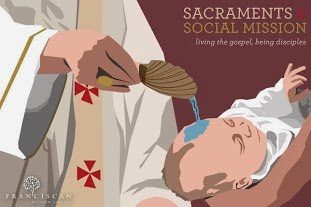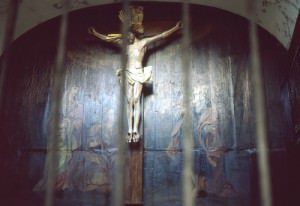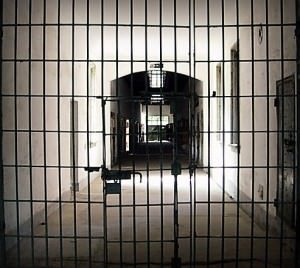Sacraments and Social Mission: Baptism’s Dignity in the Jails of Bolivia

Today in Sacraments and Social Mission: Living the Gospel, Being Disciples: Jeff Sved writes below about his ministry to bring dignity to prisoners as fulfilling the sacrament of baptism’s call to human dignity.
“Prison reform would most likely come in dead last for any social justice popularity contest in the US.
 |
| “Jailed Christ” |
Much of that is because of how marginalized prisons are.
Physically, in the US, prisons are about as far on the margins of society as possible… making people who are incarcerated very easy to forget.
In Bolivia, the majority of prisons are downtown, making them very accessible and visible, which is likely why there is much more media coverage of prison-related issues here than in the states.
In both Bolivia and the US, however, there is a stigma around any period of incarceration.
Regardless of the crime (and often independent of a conviction) we allow the label of “former inmate” to trump the true title of “beloved child of God’ which we recognize in our Baptism.
 |
| “Prison reform would most likely come in dead last for any social justice popularity contest in the US.” |
While the Jesus as death-row-inmate or Christ-the-Captive image may be uncommon outside of the prison system, it is an image of Christ that is often discussed within prison ministry.
One of the first reflections used on the KAIROS prison ministry retreat weekend that I was blessed to be a part of while serving in Wilmington calls to mind the reality of Christ as a prisoner who endured brutal torture and a public execution. Those are not images with which the average Christian can identify, but are very powerful in discussing a Jesus who can walk with you during the hardships of time in prison.
During my time involved with various prison ministries, I’ve learned how much I’ve missed by judging others solely on their mistakes.
In the past, I allowed the label “inmate” or “former inmate” to mean “bad person” without any consideration beyond their prison sentence.
In our Baptism we claim a unity with God and through God, and by dismissing “inmates” in the past I was really dismissing my brothers and sisters, with many of whom I share a common Baptism.
Many who are incarcerated recognize that they have been stripped of what we consider basic human dignity.
In Bolivia, inmates know that they are living in worse conditions than most farm animals, and after a few months, let alone years, of living in those conditions you can begin to forget the inherent dignity of what it means to be human. In the US, especially when in solitary confinement, it’s even easier to lose a connection to your own humanity as you are pushed away from human connection.
Ministry of presence is simply time shared together, and in the prison setting it serves as a simple yet strong reminder that you are loved, you are worth visiting, you are a human being with dignity.
 |
| Pope Francis celebrated his first Holy Thursday mass at Casal del Marmo, a juvenile detention center |
Many prisoners are lucky to have a priest set aside enough time during Holy Week to celebrate a combined Easter Triduum mass that covers parts of Holy Thursday-Good Friday-Easter.
It honestly was a bit shocking that a Holy Thursday mass was offered in a prison of any kind.
So for Pope Francis (or El Papa Pancho) to affirm that the faith of the teens in Casal del Marmo is just as important as the faith of Christians who aren’t incarcerated for me was a huge statement.”
Tagged in:
